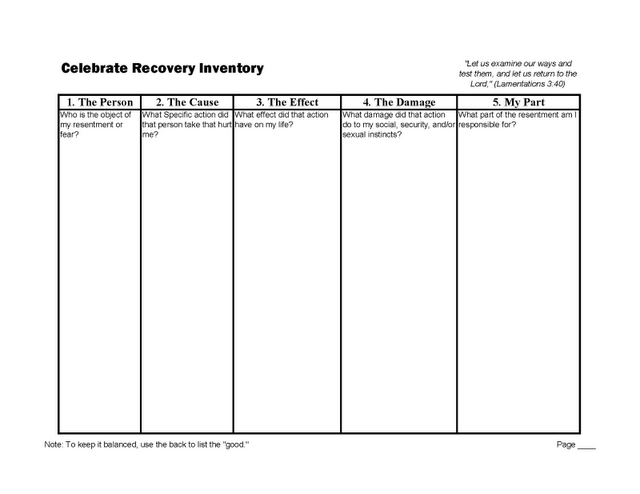Principle 4: Openly examine and confess my faults to myself, to God, and to someone I trust.
Happy are the pure in heart. -Matthew 5:8
Step 4: We made a searching and fearless moral inventory of ourselves.
Let us examine our ways and test them, and let us return to the Lord. -Lamentations 3:40
The inventory presented in lesson 9 is actually the first of three parts to the self-examination process. Once the entire process is complete, you will have the inventory that is presented in this lesson, as well as answers to questions in Spiritual Inventory Part I (lesson 10) and Spiritual Inventory Part II (lesson 11).
The inventory in this lesson is open-ended and can seem unclear as to what participants are actually supposed to do. Guidelines are provided, and worksheets are available, but ultimately I believe it was designed this way so that the participant can adapt this inventory to whatever purpose they need it to be. The primary goal of this inventory is to assess your relationships with others: who you have hurt, and who has hurt you.
The participant books have space for you to write your inventory for this lesson, however my guess is that it won’t be enough room. There are many printable versions available online, one of which I’ve posted below.
As you can see, the inventory has been divided into a chart with five columns. Each column should list the appropriate response to the heading. The headings include: The Person, The Cause, The Effect, The Damage, and My Part.
The Person
This column should be self-explanatory: list the person or object you resent or fear OR list a person you have hurt.
The Cause
List the specific action(s) the person did to hurt you OR the action(s) you did to hurt them.
The Effect
How did the action(s) affect your life?
The Damage
Which of your basic instincts were injured? (Social, Security, Sexual) OR which of the other person’s basic instincts were injured?
My Part
What part of your resentment or actions is your responsibility? (If you were a victim of abuse, write “none” in this column)
Some of us might have a long list of people we have hurt, others might have a long list of people who have hurt us, and others might have an equal amount on each end. This part of the self-examination process can take a significant amount of time and effort, since it is open-ended and encompasses your entire life. Feel free to take as much time as you need to complete the inventory, but I caution you to set a deadline for yourself and ask your accountability partner or sponsor to hold you to it. It is easy to put off dealing with difficult memories, and prolonging this step could hinder your progression through the 12 steps.
If you become overwhelmed with thoughts and feelings during this exercise, take a step back and take a break. Spend time reading the promises of God’s Word and in prayer, and reach out to your sponsor and support system. The work can be hard and painful, but the reward of healing and wholeness will be worth it in the end.




